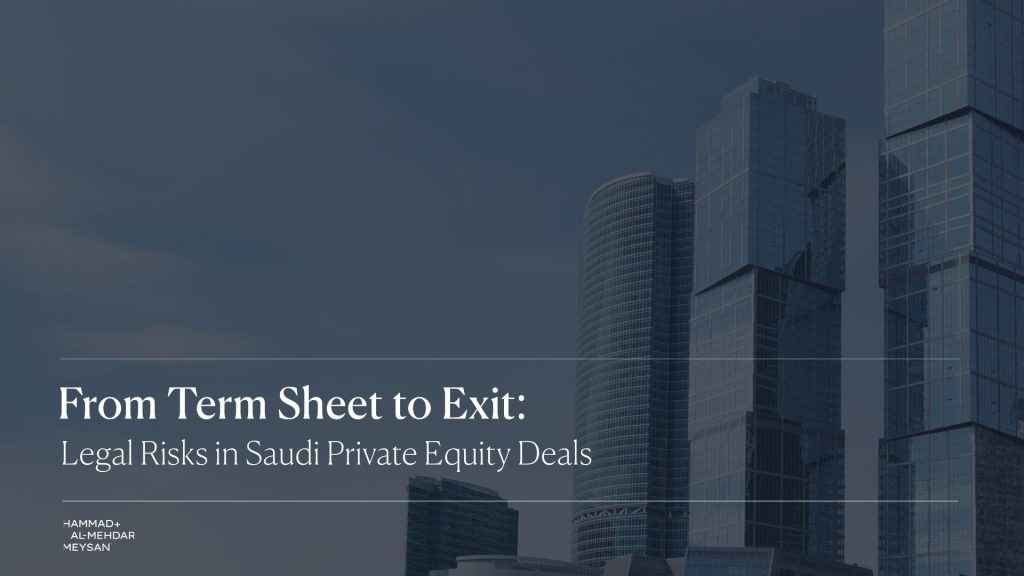
Private equity (PE) has become a vital driver of investment activity in Saudi Arabia, fuelled by the Kingdom’s ambitious Vision 2030 agenda, diversification initiatives, and growing appetite for alternative asset classes. With sectors such as healthcare, technology, education, logistics, and energy transition attracting increasing investor attention, private equity transactions are gaining both scale and sophistication. Yet, while opportunities are abundant, private equity deals in Saudi Arabia carry unique legal risks at every stage of the investment cycle from negotiating the initial term sheet through to structuring the exit.
The Term Sheet
The term sheet is often the first formal step in a private equity deal, outlining key commercial and legal principles before binding agreements are executed. Although commonly perceived as non-binding, specific provisions such as exclusivity, confidentiality, and governing law typically carry legal force.
In Saudi Arabia, the drafting of term sheets requires careful attention to regulatory limitations on foreign ownership, mandatory licensing requirements, and competition considerations. Ambiguity or over-reliance on boilerplate language may result in misaligned expectations or unenforceable provisions. Investors should also be cautious about inadvertently creating binding obligations on financing commitments or valuations before due diligence is completed.
Due Diligence: Identifying Hidden Liabilities
Comprehensive due diligence is critical in the Saudi market, where regulatory compliance and governance structures vary significantly across industries. Key risk areas include:
- Licensing and Regulatory Compliance: Foreign investment restrictions, validity of MISA licences, and sector-specific approvals (e.g. in banking, insurance, or telecoms).
- Corporate Governance: Accuracy of shareholder registers, board structures, and compliance with the Companies Law.
- Employment Matters: Saudisation obligations, end-of-service benefits, and ongoing labour disputes.
- Tax Exposures: Outstanding zakat, tax liabilities, and transfer pricing compliance.
- Contractual Risks: Change-of-control clauses, termination triggers, and enforceability of key agreements.
Failure to identify such risks early can lead to inflated valuations, disputes, or regulatory penalties that undermine deal viability.
Investment Structuring: Balancing Control and Compliance
Once risks are identified, structuring the investment is central to mitigating exposure and aligning investor interests with those of the founders or existing shareholders. Common approaches include minority equity stakes, joint ventures, or complete acquisitions.
Private equity investors in Saudi Arabia often seek protective rights such as reserved matters, board representation, and veto powers. However, these must be carefully balanced to avoid contravening restrictions on foreign ownership control or inadvertently triggering regulatory reclassification of the entity.
Moreover, financing structures involving shareholder loans, convertible instruments, or profit participation arrangements must be assessed for compliance with the Saudi Companies Law and tax framework. Improperly structured financing could give rise to recharacterisation risks or adverse withholding tax implications.
Shareholders’ Agreements: Allocating Rights and Responsibilities
The shareholders’ agreement (SHA) is a cornerstone of private equity deals, defining governance, management, and exit mechanics. Key areas of legal risk include:
- Transfer Restrictions: Right of first refusal, tag-along, and drag-along rights must be enforceable under Saudi law and aligned with regulatory approvals.
- Dividend Policies: Profit distribution arrangements must comply with the Companies Law and should account for zakat and tax considerations.
- Deadlock Mechanisms: Buy-sell provisions, arbitration, or put/call options must be drafted to avoid prolonged disputes.
- Protective Rights: Reserved matters should be precise and enforceable, avoiding overly broad veto rights that could stifle operations.
A poorly drafted SHA can create prolonged disputes or undermine investor protections, particularly in scenarios involving minority ownership.
Regulatory Approvals and Competition Clearance
Saudi Arabia’s competition regime has become increasingly sophisticated, requiring notification to the General Authority for Competition (GAC) for economic concentrations that meet specific thresholds. Transactions undertaken without clearance risk administrative fines, invalidation, or unwinding.
In addition, cross-border PE transactions may require scrutiny by sector regulators such as the Saudi Central Bank (SAMA) or the Communications, Space & Technology Commission (CST). Timely engagement with regulators is critical to avoiding closing delays.
Exit Strategies: Planning Ahead
An exit strategy should be considered from the outset of the investment. In Saudi Arabia, private equity exits typically occur through:
- Trade Sales: Transfers to strategic buyers, often requiring fresh regulatory approvals.
- Secondary Buyouts: Sales to another private equity fund, involving negotiation over warranties, indemnities, and valuation mechanisms.
- Initial Public Offerings (IPOs): Increasingly viable with the growth of the Saudi capital markets, particularly Tadawul’s Main Market and Nomu (parallel market).
Each exit route carries distinct legal risks. For instance, IPOs are subject to rigorous disclosure obligations and approval from the Capital Market Authority (CMA). Trade sales may encounter competition scrutiny or change-of-control restrictions, while secondary buyouts often involve complex indemnity negotiations over legacy liabilities.
Dispute Resolution and Enforcement
Disputes in private equity deals often arise over valuation adjustments, earn-outs, or breaches of warranties. Arbitration is commonly chosen as the dispute resolution mechanism, with Saudi Arabia being a signatory to the New York Convention and having modernised its arbitration framework. The Saudi Centre for Commercial Arbitration (SCCA) offers a credible local platform, although enforcement remains subject to Sharia principles and oversight by local courts.
Private equity transactions in Saudi Arabia present investors with attractive opportunities, but they also carry legal risks across every stage of the deal lifecycle. From negotiating binding provisions in a term sheet to navigating regulatory approvals, drafting enforceable shareholders’ agreements, and structuring a viable exit, success depends on anticipating risks and embedding safeguards at the earliest stage. With the Kingdom’s regulatory framework becoming increasingly sophisticated, proactive risk management and careful structuring are essential for international and domestic private equity investors alike.
